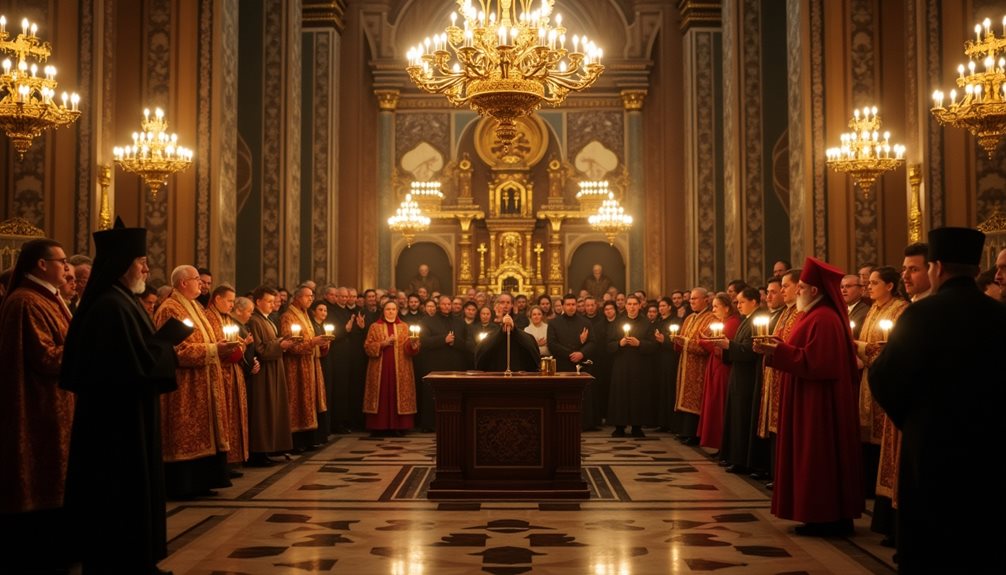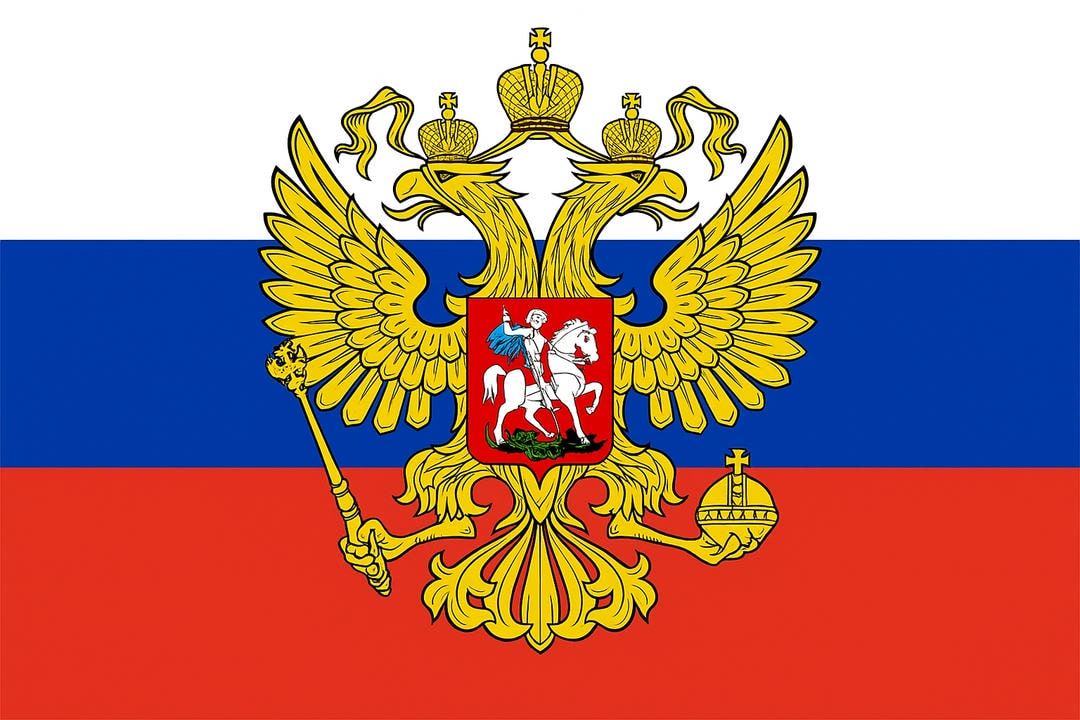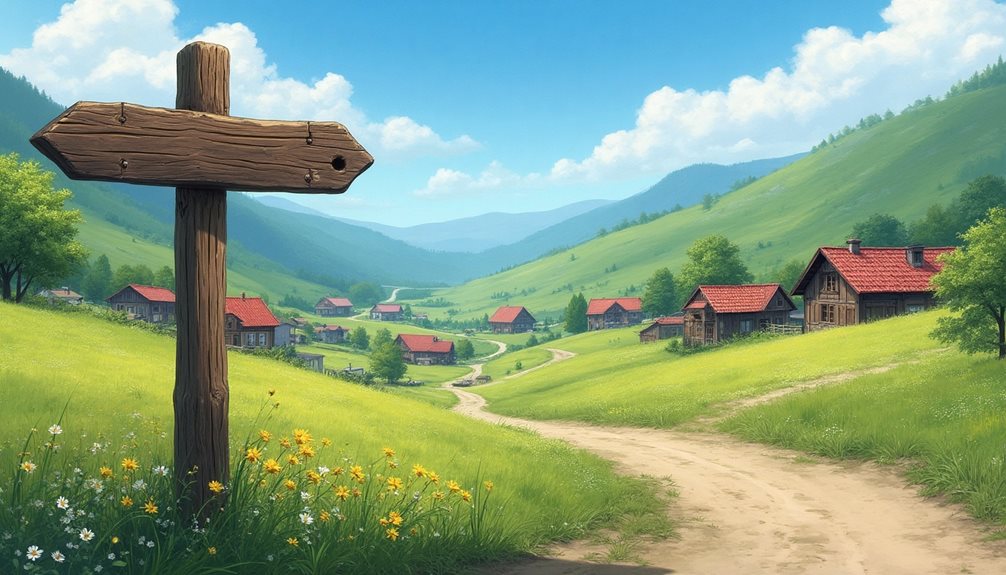Russia’s diverse regions offer varying economic, cultural, and social incentives that influence immigration patterns. Key areas like Moscow and St. Petersburg serve as major economic and cultural centers, while others such as Krasnodar Krai and Tatarstan provide unique regional advantages. Understanding these differences is essential for policymakers and migrants alike. The following analysis highlights eight top regions, examining their specific attributes and potential challenges that impact immigrant attraction and integration.
Why Russia is Attracting Foreigners
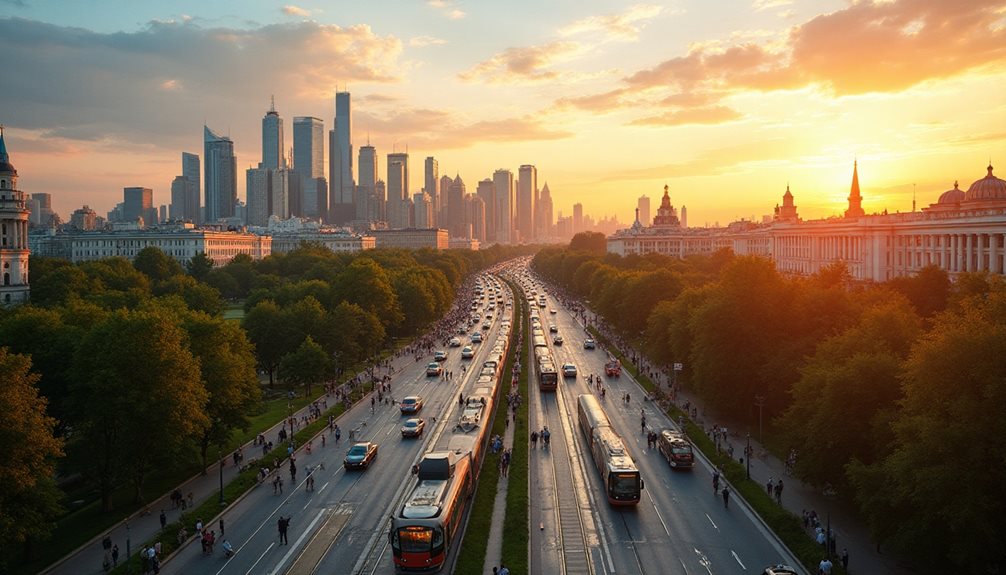
Russia is increasingly recognized as an attractive destination for foreigners seeking new opportunities. This shift is driven by a combination of economic potential, diverse cultural experiences, and Russia’s unique geographic location bridging Europe and Asia. Understanding what draws people to Russia, and the specifics of its most popular regions, can help newcomers make informed decisions about where to settle.
Russia’s large and dynamic economy offers a wide range of employment options, from energy and construction to IT, agriculture, and services. Many companies actively seek foreign specialists to fill skills gaps, especially in rapidly developing sectors. Competitive salaries in key urban centers and the chance to build a career in a transforming economy are strong motivators.
With over 190 ethnic groups and centuries of multicultural history, Russia provides a welcoming environment for people from different backgrounds. Major cities are especially known for their cosmopolitan atmosphere, international schools, and diverse communities, making it easier for newcomers to adapt.
Recent reforms have made it easier to obtain work permits and visas. Streamlined bureaucracy, especially for professionals and entrepreneurs, reflects Russia’s commitment to attracting global talent.
Investment in infrastructure—modern housing, efficient public transport, healthcare, and education—is visible across many regions. Newcomers benefit from improved quality of life and access to amenities.
Russia’s vast territory offers unique advantages: proximity to both European and Asian markets, varied climates, and access to natural resources. This diversity allows immigrants to choose regions that best suit their personal and professional needs.
What Migrants Consider Most When Relocating
When choosing where to live in Russia, foreigners typically weigh these factors:
- Job availability in their field
- Affordability of housing and daily expenses
- Access to social services (healthcare, education)
- Integration support (language classes, expat networks)
- Safety and quality of life
- Long-term growth prospects
Regions that balance these elements are especially attractive to newcomers. Following, you’ll learn about the strengths of different Russian regions—where jobs are available, which places have vibrant communities, and where supportive policies are in place. You’ll also get a sense of potential challenges, like dealing with paperwork or meeting local language requirements, so you know what to expect and can prepare ahead of time. There are also practical tips to help you integrate smoothly and thrive in your new surroundings.
Russia’s regions offer a wide range of opportunities and experiences for foreign migrants. By getting to know the unique features of each area—such as economic vitality, social infrastructure, and possibilities for integration—you can make confident choices about your future in this vast and ever-evolving country.
Whether you’re aiming for career growth, looking for a welcoming community, or searching for a fresh start in a dynamic place, Russia has promising options for newcomers who are ready to make the most of what it offers.
Moscow: The Economic Heart of Russia
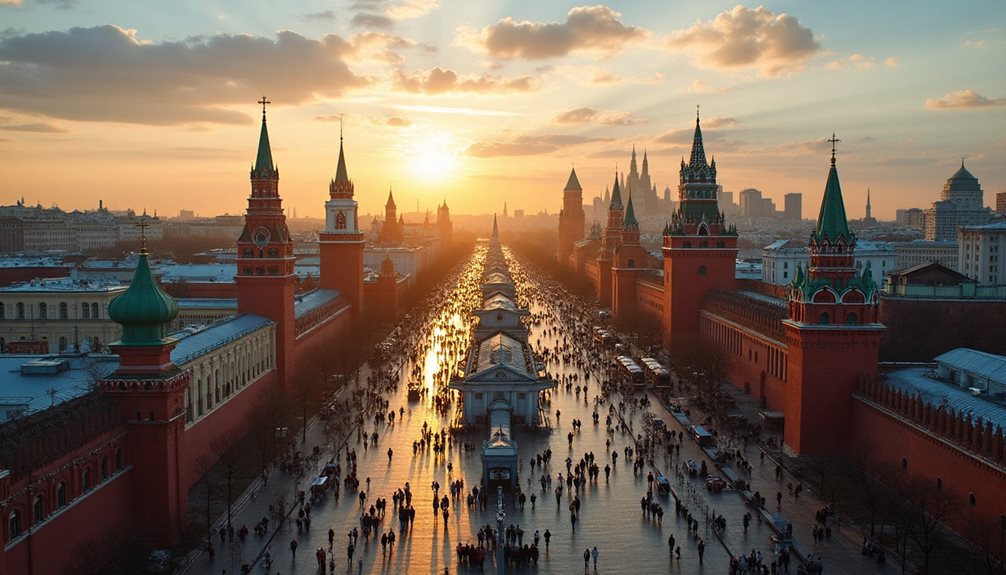
Moscow is the undisputed economic heart of Russia, generating about 20% of the country’s GDP—more than any other city or region. As the capital and the seat of government, it hosts the headquarters of Russia’s largest corporations, major banks, financial institutions, and international companies operating in the country.
The city’s economy is diverse and dynamic. The financial sector centers around the Moscow Exchange, one of Eastern Europe’s largest stock markets. Moscow is also a leading technology hub, with a rapidly expanding IT industry supported by innovation clusters like Skolkovo Technopark. Manufacturing remains an important part of the economy, producing everything from automobiles to high-tech electronics and pharmaceuticals.
A broad service sector employs millions across retail, hospitality, healthcare, education, and creative industries. Moscow attracts skilled professionals from all over Russia and beyond, drawn by competitive salaries and abundant career opportunities.
Culturally, Moscow is a vibrant global metropolis. Its world-famous theaters, galleries, concert halls, and museums—such as the Bolshoi Theatre and Tretyakov Gallery—welcome millions of visitors yearly. The city’s rich history is visible in iconic landmarks like the Kremlin and Red Square, blending tradition with modern life seamlessly.
Moscow’s infrastructure is among the best in Russia. The metro system is one of the busiest and most efficient in the world, carrying over 7 million passengers daily. The Moscow City business district with its skyscrapers symbolizes the city’s modern ambitions. Continuous investments in logistics, digital connectivity, and urban development further boost its business environment.
The city’s regulatory and legal frameworks encourage entrepreneurship and investment. Moscow regularly hosts important international events like the Moscow Urban Forum and Russian Energy Week, positioning itself as a key player in global economic discussions.
For those seeking economic opportunity and professional growth, Moscow offers a diverse job market with high salaries—often 30–40% above the national average. This allows skilled workers to enjoy better financial security and career advancement. Entrepreneurs benefit from a well-developed commercial ecosystem that includes modern offices, business incubators, strong networking communities, and access to both Russian and international markets.
Housing options in Moscow are varied, ranging from historic apartments in the city center to modern high-rise complexes in newer districts. While premium locations tend to be more expensive, there are affordable choices in emerging neighborhoods that continue to improve amenities.
Transport and connectivity are strengths of the city. The extensive metro network with over 250 stations ensures fast, reliable travel across Moscow. Additional buses, trams, suburban trains, and new cycling paths enhance mobility further. Three international airports—Sheremetyevo, Domodedovo, and Vnukovo—connect Moscow directly to Europe, Asia, and the Middle East. High-speed trains link Moscow efficiently to other major Russian cities.
Digital infrastructure supports modern work styles with widespread high-speed internet access and public Wi-Fi available in parks and transport hubs.
Moscow also offers high-quality healthcare with advanced hospitals and clinics staffed by highly qualified specialists using modern diagnostic equipment. Education is well served by many international schools offering British, American, French, German, or IB curricula—ideal for expatriate families—as well as prestigious universities like Lomonosov Moscow State University that attract students globally.
Life in Moscow includes abundant cultural and recreational opportunities. Museums, galleries, theaters, concert halls, festivals, open-air events, world-class ballets at the Bolshoi Theatre, diverse international cuisine, and large green spaces like Gorky Park and Zaryadye Park all contribute to a rich lifestyle.
Living in Moscow comes with some challenges. The cost of living is higher than in other parts of Russia, especially rent in popular neighborhoods and prices for imported goods. Careful budgeting helps newcomers manage expenses effectively. The city’s large population—over 12 million residents—and fast pace mean rush hour traffic can be heavy despite excellent public transport. Adjusting to this vibrant urban rhythm brings both demands and rewards.
In summary, Moscow offers high salaries and career growth in a thriving economy supported by modern healthcare, diverse education options, efficient transport, global connectivity, and a rich cultural scene. For immigrants seeking new opportunities and a high standard of living within Russia’s most cosmopolitan city, Moscow presents a welcoming environment full of potential for success and personal fulfillment.
St. Petersburg: Russia’s Cultural Jewel
St. Petersburg is often called Russia’s cultural jewel, known for its rich history, vibrant arts, and unique city charm. Whether you love art, history, or simply want to live in a lively and welcoming place, St. Petersburg offers a rewarding experience for both residents and visitors.
Founded by Peter the Great in 1703, the city is filled with iconic landmarks such as the Winter Palace, Peterhof, and the Church of the Savior on Spilled Blood. Its classical architecture, baroque facades, and elegant canals give St. Petersburg a distinctive character often compared to the great European capitals.
The city is home to over 200 museums, including the world-famous Hermitage Museum, which holds one of the largest art collections in the world. The Mariinsky Theatre is a major cultural highlight, renowned for its ballet and opera performances. St. Petersburg also hosts many artistic festivals, like the White Nights Festival—a celebration of music, dance, and literature during the city’s famous period of midnight sun—creating a lively atmosphere full of creativity and cultural exchange.
Food lovers will enjoy the city’s culinary diversity. Traditional Russian dishes such as borscht, beef stroganoff, and blini are widely available alongside international cuisine that reflects the city’s cosmopolitan spirit. Cafés, bakeries, and restaurants offer choices for every taste and budget.
Compared to Moscow’s fast pace, St. Petersburg has a more relaxed lifestyle. Its extensive public transportation system—including metro, buses, and trams—makes getting around easy and efficient. Housing options range from historic apartments in the city center to modern developments in quieter districts. Essential services like healthcare and education are well-established and accessible.
The city’s scenic beauty is one of its greatest assets. Picturesque waterfronts, leafy parks, graceful bridges, and the Neva River running through the city provide stunning views and peaceful spots for relaxation. Gardens such as the Summer Garden offer tranquil green spaces for residents to enjoy.
St. Petersburg is known for its friendly and open community. A growing number of expatriates and international students contribute to a lively cultural exchange. Many locals speak English or other foreign languages, especially in central neighborhoods and tourist areas.
The climate features cool summers and cold winters with frequent cloud cover and precipitation—about 240 cloudy days per year—so it’s wise to be prepared for grey skies and occasional rain. Yet, this brings unique seasonal charm: the white nights of summer bring nearly 24-hour daylight, while winter covers the city in beautiful snow.
In terms of employment, St. Petersburg is a major center for culture, tourism, education, and IT services, though its job market is smaller than Moscow’s, especially in finance and some high-growth tech sectors. Still, international companies, educational institutions, and creative industries offer opportunities for foreigners with relevant skills or language knowledge.
Daily life in St. Petersburg is comfortable and fulfilling. The city provides excellent shopping, modern fitness centers, sports clubs, libraries, cinemas, and family-friendly attractions like aquariums and amusement parks.
Foreigners choose St. Petersburg for many reasons: its rich culture and history with world-class museums and theaters; a relaxed urban environment featuring beautiful streetscapes and waterways; affordable living with varied housing options; a welcoming community with cultural exchange opportunities; and quality public transport that makes car ownership unnecessary.
Those considering a move should be aware of the weather’s frequent clouds and colder months, research job opportunities ahead of time if planning to work, and consider learning some Russian to feel more at home quickly.
St. Petersburg stands as a remarkable city where history meets modern life within a warm, inviting atmosphere. For those who appreciate culture, community spirit, and beautiful surroundings, it offers an exceptional place to live and grow.
Nizhny Novgorod: Volga’s Economic and Historical Powerhouse
Nizhny Novgorod, often called simply “Nizhny,” is one of Russia’s major cities known for its strong industrial base, rich history, and high quality of life. Located where the Volga and Oka rivers meet, it serves as an important connection between European Russia and the eastern regions, making it an appealing place for professionals and families alike.
Founded in 1221, Nizhny Novgorod has a deep historical legacy visible in its medieval Kremlin, historic merchant districts, and age-old churches. During the Soviet period, it was known as Gorky and played a key role in military and scientific industries. Today, it has re-emerged as a vibrant regional capital with a modern and diverse economy.
The city is a leading industrial hub in Russia, especially known for engineering, automotive manufacturing, shipbuilding, aerospace, and IT sectors. Major companies like GAZ (Gorky Automobile Plant) and Sokol Aircraft Plant are based here, alongside a growing number of tech startups. Opportunities also exist in finance, trade, education, logistics, and creative fields.
Nizhny Novgorod actively supports innovation through technology parks, business incubators, and government investment programs. Universities such as Lobachevsky State University supply a steady flow of skilled graduates and research-driven businesses. Its strategic location on transport routes linking Moscow with the Urals and Siberia makes it a key logistics center. The Volga River supports shipping and commerce while the city’s international airport and rail networks ensure efficient connections across Russia and Europe.
Housing options in Nizhny are diverse, from historic apartments with river views to modern residential complexes. Compared to Moscow or St. Petersburg, real estate is more affordable, giving newcomers greater flexibility in choosing where to live.
The city offers reliable public transportation including metro, trams, and buses, along with modern healthcare facilities, shopping centers, and comprehensive education options—including international schools. Urban parks along the Volga embankment provide beautiful spaces for recreation for all ages.
Culturally, Nizhny Novgorod has a lively arts scene with theaters, philharmonic concerts, festivals, museums, and galleries. The annual Nizhny Novgorod International Film Festival is a highlight. Local cuisine features Volga fish dishes alongside Russian classics. Expats find friendly local communities and growing international networks welcoming. English is increasingly spoken in business, tourism, and higher education circles.
Nestled on dramatic hills overlooking the Volga River, the city offers stunning panoramic views from spots like the Kremlin walls or Chkalov Stairs. Outdoor lovers enjoy river cruises, hiking nearby nature reserves, winter sports, and summer festivals along the waterfront.
Daily life in Nizhny balances modern convenience with tradition. Residents enjoy vibrant markets, cozy cafés on pedestrian streets such as Bolshaya Pokrovskaya, riverside promenades, sports clubs, libraries, cinemas, gyms, and family-friendly entertainment.
For those considering a move to Nizhny Novgorod, some points to keep in mind include its continental climate with cold winters and warm summers—so warm clothing is essential from late autumn through early spring. Russian language skills are important for most professional roles and everyday life. Since many jobs focus on manufacturing and engineering, researching employment opportunities beforehand is recommended. Some districts are undergoing modernization; exploring neighborhoods will help you find the best fit.
In summary, Nizhny Novgorod offers strong job prospects for technical specialists and entrepreneurs within a welcoming community that blends rich Russian heritage with modern amenities. Its picturesque setting on the banks of the Volga provides both urban comforts and access to nature—making it an excellent choice for those seeking career growth and quality living in Russia’s heartland.
Krasnodar Krai: Russia’s Southern Gateway to the Sun and Sea
Krasnodar Krai, located in southern Russia, is a vibrant and fast-growing region known for its warm climate, beautiful Black Sea coastline, and attractive lifestyle. It has become a popular destination for both Russians and foreigners seeking a high quality of life, combining leisure, opportunity, and rich culture.
The region enjoys a subtropical climate with mild winters and long, sunny summers, making it one of the warmest areas in Russia. This favorable weather supports a wide range of outdoor activities year-round, including beach outings, hiking, cycling, and exploring natural parks. Resort cities like Sochi, famous for hosting the 2014 Winter Olympics, offer a unique blend of seaside relaxation and mountain adventures. Whether you enjoy swimming in the Black Sea or hiking the nearby Caucasus foothills, there is something to suit every preference.
One of the region’s biggest draws is its affordable real estate market. Property prices here are generally much lower than in major Russian cities like Moscow or St. Petersburg, making homeownership more accessible. The growing demand for housing, fueled by tourism and migration, has sparked ongoing development with modern amenities across many areas. Rental prices and living costs remain reasonable outside the major resort zones, attracting families, young professionals, and retirees alike.
Economically, Krasnodar Krai is dynamic and diverse. Tourism plays a key role, supporting jobs in hospitality, transport, retail, and real estate. The region also benefits from fertile soil and a favorable climate that support strong agricultural production including fruits, vegetables, grains, and wine. Government initiatives focus on expanding infrastructure such as roads, airports, and healthcare facilities while encouraging business investment. Access to the Black Sea enhances trade and logistics opportunities. Although the economy has some seasonal fluctuations tied to tourism and agriculture, efforts are underway to develop year-round industries like manufacturing, logistics, and IT services.
The local cuisine reflects the area’s multicultural heritage and agricultural abundance. Fresh produce and seafood from the Black Sea are staples alongside traditional Russian dishes and Caucasian specialties like shashlik (grilled meat). Urban centers offer a growing variety of international dining options. Food markets are full of local fruits, cheeses, and handmade treats.
A strong sense of community characterizes Krasnodar Krai. Locals are known for their friendliness and hospitality toward newcomers. Increasing numbers of expatriates and internal migrants have created diverse communities in cities like Krasnodar and Sochi. The region balances urban conveniences with close proximity to nature through parks, promenades, beaches, and cultural venues. Families benefit from good schools, sports facilities, and quality medical care.
In summary, Krasnodar Krai offers many advantages: warm weather with sunshine throughout most of the year, affordable housing compared to larger Russian cities, an active lifestyle with access to beaches and mountains, a growing economy with expanding infrastructure and business opportunities, diverse cuisine rooted in local tradition, and welcoming communities open to newcomers.
It is important to keep in mind that some jobs tied to tourism and agriculture may be seasonal, so planning for year-round employment is advisable. Regional wages tend to be lower than in Russia’s largest cities. Rapid development can occasionally strain infrastructure in newly built districts.
Everyday life in Krasnodar Krai’s main cities like Krasnodar and Sochi includes modern shopping centers, excellent healthcare services, universities, entertainment venues, cultural events, and international schools. Public transportation is well-developed in urban areas. Numerous festivals celebrating local traditions, food, music, and sports take place throughout the year, especially during the long summer season.
With its sunny climate, affordable living options, vibrant cultural scene, economic potential, and warm communities, Krasnodar Krai stands out as an appealing choice for those looking to make southern Russia their home.
Kaliningrad: Russia’s Baltic Gateway with a European Flavor
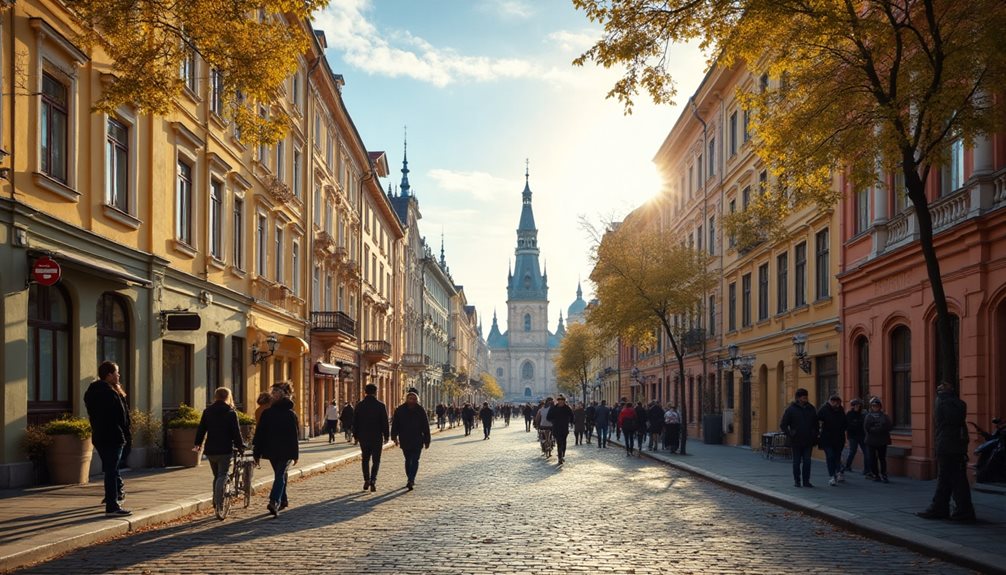
Kaliningrad is a unique part of Russia, located on the Baltic Sea and bordered by Poland and Lithuania. This westernmost Russian region offers a fascinating mix of European urban life and Russian culture, making it an attractive choice for those looking for something different within Russia.
Geographically separated from mainland Russia, Kaliningrad has a rich history as the former East Prussian city of Königsberg. This past is visible in its architecture, cobbled streets, historic fortresses, and leafy boulevards. The city’s look and feel are strongly influenced by European styles, with landmarks like the Gothic cathedral and red-brick buildings standing out alongside well-kept public spaces.
Life in Kaliningrad has a distinct European atmosphere. The city combines Russian conveniences with European-style cafés, galleries, and public squares. Cultural festivals often highlight its German, Polish, and Lithuanian heritage, creating a diverse and cosmopolitan environment that appeals to newcomers who appreciate international connections.
One of Kaliningrad’s biggest advantages is its proximity to the European Union. Residents can easily travel to Poland and Lithuania, which are just a short drive away. This location supports not only tourism but also opportunities for study, business, and cultural exchange. The local economy benefits from logistics, manufacturing, shipping, and service industries connected to its role as a regional gateway. Economic policies encourage investment and make it relatively easy for skilled professionals to settle and find work here.
Living in Kaliningrad means enjoying easy access to neighboring EU countries for business or leisure, experiencing a multicultural atmosphere with strong European ties, and appreciating the city’s unique architecture and green spaces. The economy offers job opportunities in logistics, manufacturing, trade, IT, and various services. Cafés, museums, theaters, cultural events, and international festivals contribute to a lively urban lifestyle.
Daily life in Kaliningrad is comfortable with well-developed infrastructure including modern shopping centers, parks, sports facilities, schools (some with international programs), and quality healthcare. The cost of living is moderate compared to Russia’s larger cities. The local food scene blends Russian and European flavors.
There are some practical considerations due to Kaliningrad’s geographic separation from mainland Russia. All goods must pass through neighboring countries or arrive by sea or air, which can affect costs or cause delays. Traveling to the Russian mainland involves crossing international borders by air or train, adding time or paperwork. Some business activities may be limited because of the distance from other Russian markets. Local regulations adapt federal Russian laws to fit the region’s specific needs.
Despite these challenges, many residents value Kaliningrad’s independence and international outlook. The city’s openness to new ideas and people makes it a popular choice for those seeking a fresh perspective within Russia.
Kaliningrad truly serves as Russia’s window on Europe—a place where history meets modern convenience. Its accessible location, cultural richness, diverse economy, and distinctive lifestyle offer something special for anyone considering a move to Russia’s Baltic coast.
Tatarstan: Where Tradition and Progress Meet
Tatarstan, located in the heart of Russia, is a region where rich traditions meet modern progress. Known for its vibrant Tatar culture and historic landmarks, it also boasts a dynamic economy, making it an inviting destination for newcomers from around the world.
The cultural diversity of Tatarstan is one of its defining features. The population mainly consists of Tatars and Russians, alongside other ethnic groups. This mix is evident in daily life, festivals, and religious practices. Both Islam and Orthodox Christianity are widely observed, with iconic sites like the Kul Sharif Mosque and the Annunciation Cathedral standing side by side in Kazan, the republic’s capital. Local traditions such as folk music, dance, crafts, and the Tatar language remain important parts of everyday life. Museums, theaters, and cultural centers celebrate this rich heritage.
Economically, Tatarstan ranks among Russia’s most advanced regions. Kazan is known for its industrial strength and growing technology sector. The region excels in petrochemicals, machine building, aviation, and IT, supported by special economic zones and government incentives that attract both Russian and international businesses. Infrastructure development is keeping pace with growth—modern roads, efficient public transport, reliable utilities, and expanding digital services make life comfortable. Sustainable urban planning with clean parks and well-maintained neighborhoods adds to the quality of living.
Education is a key focus in Tatarstan. Kazan hosts top universities like Kazan Federal University and Kazan National Research Technical University, attracting students from across Russia and abroad. Many programs are offered in both Russian and English. Workforce training aligns with local industry needs, especially in technology, engineering, healthcare, and business, helping graduates secure local or international employment.
Daily life in Tatarstan benefits from its bilingual environment—both Tatar and Russian are official languages, and many people speak both fluently. This helps newcomers integrate while preserving local culture. The regional cuisine offers hearty dishes such as echpochmak (meat pies), chak-chak (a sweet dessert), soups, and pastries. Food festivals and lively markets provide great opportunities to experience these flavors. Community events including music festivals, sports competitions, and cultural fairs take place year-round, fostering social connections among locals and newcomers alike.
Living in Tatarstan offers several advantages: a multicultural atmosphere that promotes respect and open-mindedness; a bilingual setting that supports communication; clean and safe cities with effective management; modern infrastructure including transportation, healthcare, and digital services; and excellent educational opportunities.
There are a few practical points to consider. Compared to Moscow or St. Petersburg, the international community is smaller, which may mean fewer social groups for foreigners. Direct international flight options from Kazan International Airport are somewhat limited. The continental climate brings cold winters and warm summers, which newcomers should be prepared for.
The regional government actively supports integration through language courses, cultural exchange programs, and incentives for foreign professionals. Many newcomers find locals to be friendly and eager to share their traditions.
For those interested in exploring Russia beyond its largest cities, Tatarstan offers a unique combination of tradition and modernity. Its welcoming spirit, economic potential, comfortable lifestyle, and cultural respect make it an outstanding place to live, work, or study.
Novosibirsk: Siberia’s Center of Innovation and Opportunity
Novosibirsk, Russia’s third-largest city and the unofficial capital of Siberia, has rapidly become a center for science, technology, and cultural growth. Its combination of academic excellence, affordable living, and a supportive environment for innovation attracts professionals and students from across Russia and abroad.
At the heart of Novosibirsk’s reputation as a leader in innovation is Akademgorodok, a famous research and educational district where top scientists and engineers work on advanced projects. Novosibirsk State University and numerous research institutes form the foundation of this vibrant academic community. Government initiatives, including special economic zones, technology parks, and research funding, promote the growth of tech startups and scientific achievements, earning Novosibirsk the nickname “Russian Silicon Valley.”
Education plays a key role in city life. Novosibirsk boasts several well-regarded universities and colleges specializing in science, engineering, medicine, and humanities. These institutions attract ambitious students eager to contribute to research and gain practical experience. Close cooperation between universities and local businesses helps graduates smoothly enter the workforce, especially in IT, engineering, biotechnology, and other high-demand sectors.
One of Novosibirsk’s biggest advantages is its affordability compared to Moscow or St. Petersburg. Housing prices and general living costs are lower, making it easier for newcomers to settle comfortably. The city offers well-developed public transportation, parks, shopping centers, theaters, and sports facilities. A wide range of cultural and recreational activities is available throughout the year.
Novosibirsk’s population is diverse, with people from different Russian regions and neighboring countries. This multicultural environment fosters creativity and collaboration in academic and professional settings. Festivals, international cuisine, and cultural centers provide opportunities to connect with various communities.
For skilled professionals, Novosibirsk offers strong prospects in the technology sector, career growth through university-business partnerships, and support for entrepreneurship via incubators and investment programs.
Daily life includes dealing with long, cold winters where temperatures can drop below –20°C. However, the city’s well-maintained infrastructure ensures smooth daily routines even during harsh weather. While the international community is smaller than in Russia’s largest cities, locals are known for their hospitality and willingness to help newcomers adjust. Reliable public transportation—including buses, trams, and an efficient metro—makes getting around convenient.
Living in Novosibirsk means benefiting from affordable housing and daily expenses, access to excellent educational institutions, growing job opportunities in technology and science, and a rich cultural scene with museums, theaters, concerts, and festivals.
Some practical points to consider include preparing for severe winters with appropriate clothing and activities, as well as a smaller expat community that offers a chance to immerse fully in Russian culture.
Local authorities actively support newcomers through language courses, networking events, and cultural programs that ease integration. The city’s open attitude toward innovation extends to welcoming new residents.
For those seeking a vibrant scientific hub combined with affordable urban living and strong career opportunities, Novosibirsk stands out as an excellent choice. Its emphasis on education, innovation, and multiculturalism creates an environment where both locals and newcomers can thrive.
Did you know? Akademgorodok in Novosibirsk hosts over 30 research institutes and has produced Nobel Prize winners in physics!
Yekaterinburg – Ural Gateway to East and West
Yekaterinburg is a unique city straddling the border between Europe and Asia, making it a true gateway connecting two continents. As the unofficial capital of the Ural region, it stands as one of Russia’s largest and most important cities, playing a crucial role in industry, transportation, and culture. This strategic location offers a remarkable blend of traditional Russian heritage and modern growth, attracting businesses and people seeking both opportunity and a rich cultural experience.
Living in Yekaterinburg offers many advantages. The city is well balanced between urban development and green spaces, providing residents with the comforts of city life without the stress of overcrowding or excessive costs. The cost of living here is manageable compared to Moscow or St. Petersburg, making it an appealing choice for those who want quality city amenities without the highest price tags.
Yekaterinburg is steeped in history and culture. It played a significant role in Russia’s past—from its connection to the Romanov family to its Soviet-era achievements. This deep historical backdrop is reflected in the many museums, theaters, and regular music festivals throughout the year. These cultural offerings create a vibrant community atmosphere that residents and visitors alike appreciate.
For professionals and entrepreneurs, Yekaterinburg presents numerous business opportunities. As a major economic center outside Russia’s two largest cities, it hosts industries such as manufacturing, logistics, mining, and IT. The city’s position as a transportation hub also means easy access to both European and Asian markets, making it ideal for companies looking to expand their reach.
On the other hand, Yekaterinburg’s international presence is smaller compared to Moscow or St. Petersburg. While there is a growing expat community, it remains relatively modest. English is mostly spoken within business environments, so learning some Russian can be very helpful for daily life. Navigating bureaucracy or local services often requires at least basic language skills, but this also offers an enriching opportunity to immerse oneself fully in Russian culture.
Overall, Yekaterinburg combines the best of tradition and modernity with a unique geographic position that few other cities can match. For foreigners considering moving to Russia, it offers an exciting and rewarding experience grounded in history, culture, and economic vitality—all while providing a welcoming community and a high quality of life.
Vladivostok: Russia’s Pacific Window
Vladivostok, located on the shores of the Sea of Japan at Russia’s far eastern edge, is a lively port city and the administrative center of Primorsky Krai. Often called Russia’s “gateway to Asia,” Vladivostok offers a distinctive combination of European and Asian influences, dynamic economic prospects, and breathtaking natural scenery. Its close proximity to China, Japan, and Korea—just a few hours away—makes it an exceptional hub for international trade, travel, and cultural exchange.
The city’s economy benefits greatly from its status as a free port, attracting significant investment and fostering an environment that supports entrepreneurship and international business. As a key point on the Trans-Siberian Railway and home to the Russian Pacific Fleet, Vladivostok plays an important role in shipping, logistics, fisheries, shipbuilding, and import/export activities. Its port status provides customs advantages and streamlined procedures for foreign companies, encouraging numerous joint ventures and international businesses to establish operations here to tap into Asia-Pacific markets.
Government initiatives back the development of technology parks, startup incubators, and regional growth projects. Local universities work closely with industries to promote research in marine biology, transport engineering, and information technology. Although Vladivostok’s tech sector is still growing compared to Novosibirsk or Yekaterinburg, it shows steady progress and increasing innovation.
Education is a highlight in Vladivostok, anchored by Far Eastern Federal University (FEFU), which attracts students from across Russia and neighboring Asian countries. FEFU offers several English-language programs and strong partnerships with universities in China, Japan, Korea, and beyond. Students benefit from joint research projects, exchange programs, and internships connected to international trade, marine sciences, ecology, and tourism. Graduates find career opportunities in logistics, marine industries, IT, hospitality, public administration, and international business. Language skills—especially in English, Chinese, or Korean—enhance job prospects in the city’s globally oriented economy.
Living in Vladivostok offers a comfortable urban lifestyle with a cost of living generally lower than Moscow or St. Petersburg, though slightly higher than other regional centers due to its port status. The city is known for its scenic hillsides, refreshing sea breezes, fresh seafood markets, and lively waterfront promenades. Recent infrastructure investments have modernized public transportation, with buses, trams, ferries, new bridges connecting islands and neighborhoods, as well as new hotels and shopping centers catering to residents and visitors alike.
Vladivostok is truly multicultural. With Russians mingling alongside Chinese, Koreans, Japanese, and others, the city boasts a cosmopolitan atmosphere rare in Russia. International festivals, Asian fusion restaurants, language schools, and cultural centers enrich daily life. Thanks to trade connections and university partnerships, the city has one of the larger foreign communities outside Moscow and St. Petersburg. This diversity makes it easier for newcomers to feel welcome and quickly adapt.
Skilled professionals will find strong demand in several fields: shipping and logistics specialists are needed for customs clearance and supply chain management; marine industries require experts in shipbuilding, port management, fisheries science, and ocean engineering; international business roles open up for those with language skills working across Asia-Pacific markets; academic and research careers are available at FEFU and related institutes focusing on marine biology, ecology, international relations, linguistics, and IT.
The climate features cold winters that are milder than Siberia’s but often windy with coastal fogs. Summers tend to be humid but pleasant. The city is compact yet hilly; public transit is reliable though can get crowded during rush hours. The airport offers direct flights to many East Asian cities as well as Moscow. Cuisine highlights include fresh seafood and a variety of Asian dishes alongside traditional Russian fare.
Vladivostok offers several unique advantages: unmatched access to Asia for business or travel; a charming seaside lifestyle with beautiful landscapes and harbor views; excellent educational opportunities with international university programs; a growing job market especially in logistics, trade, engineering, and marine sectors; and rich cultural diversity reflected in city events and traditions.
Some practical points to consider include the city’s remoteness from Moscow (over 8 hours by plane), which can make domestic travel more expensive or time-consuming. While central parts of Vladivostok have seen rapid modernization—especially since hosting APEC 2012—some districts still have infrastructure behind western Russian standards. Coastal weather conditions like fog or wind may occasionally disrupt flights or shipping schedules.
City authorities actively support newcomers through language courses at universities like FEFU, professional networking events connected to business chambers or trade groups, and cultural integration programs. International students often find a welcoming environment while foreign companies benefit from business-friendly policies that simplify establishing operations.
For those looking for an energetic port city with direct links to Asia-Pacific economies combined with a rich mix of Russian and Asian cultures, Vladivostok stands out as an excellent choice. Whether your interests lie in international trade, marine science research, or simply enjoying life by the sea with fresh seafood at hand, Vladivostok offers unique opportunities unavailable elsewhere in Russia.
A notable fact: Vladivostok is home to the Russky Bridge—the world’s longest cable-stayed bridge—and Far Eastern Federal University is located on Russky Island right beside this engineering marvel.
Russia’s Regions—A World of Choices for Modern Migrants
Russia’s vastness is matched only by its diversity. From the cosmopolitan pulse of Moscow and the timeless elegance of St. Petersburg to the sun-drenched shores of Krasnodar Krai and the innovative spirit of Novosibirsk, each region opens its doors with a unique set of opportunities and experiences. Whether you crave career advancement, a welcoming multicultural community, affordable living, or adventure on the nation’s frontiers, Russia’s regions have something to offer.
Today, newcomers can find not just jobs, but also vibrant cultures, cutting-edge infrastructure, and supportive communities across the map. Policymakers and migrants alike benefit from understanding these differences—choosing the right region means matching your goals with a place that feels like home.
As Russia continues to modernize and open up, its regions are redefining what it means to live, work, and thrive in this dynamic country. For those ready to embrace new horizons, Russia stands as a land of real possibilities.


